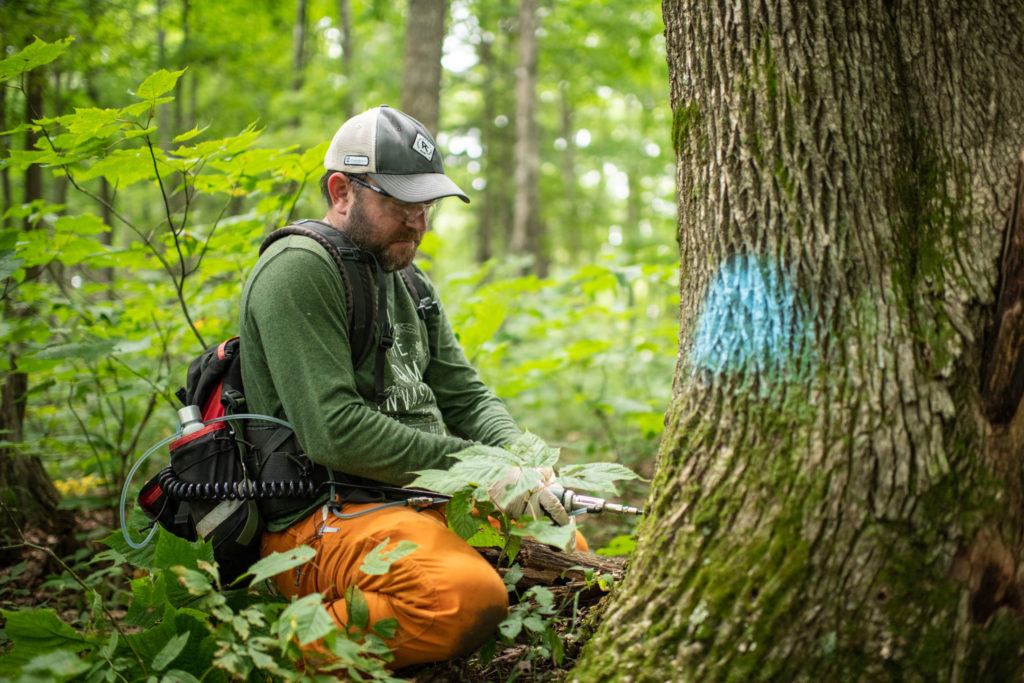Press Release
ATC Receives $515,800 from National Fish and Wildlife Foundation to Improve Forest Health
November 22, 2022
HARPERS FERRY, W.Va. (Nov. 22, 2022) – The Appalachian Trail Conservancy (ATC) announced today that it is one of 55 inaugural recipients of America the Beautiful Challenge funding from the National Fish and Wildlife Foundation. The $515,800 grant will support the ATC’s efforts to manage invasive species and protect endangered ash trees in national forests in five states through which the Trail passes: Georgia, North Carolina, Tennessee, Virginia, and West Virginia. The ATC team will treat 835 ash trees and invasives across 300+ acres, as well as monitor some 4,000 acres of additional forestland.
“The Appalachian Trail Conservancy is honored to receive this generous grant from the National Fish and Wildlife Foundation to support forest and ecosystem health along the southern half of the Appalachian Trail,” said Sandra Marra, President and CEO of the ATC. “This region is one of the most biodiverse in the entire East Coast, and that is part of what makes the A.T. so globally significant and beautiful for our millions of annual visitors. The ATC is uniquely positioned to undertake this effort because we are the sole nonprofit organization responsible for protecting every mile of the Trail.”

Injecting ash trees with a treatment is the only known cure to protect against the EAB. Photo: Horizonline Pictures.
A single invasive species has destroyed hundreds of millions of ash trees across North America, including thousands along the 2,194-mile-long Appalachian Trail. A metallic green beetle about the size of a grain of rice, the Emerald Ash Borer (EAB) is a highly effective killer. Once infected, an ash tree has less than a 1% chance of surviving. A pesticide treatment has proven effective at inoculating ash trees against the EAB, but at a cost of up to $100 to save just one tree. The National Fish and Wildlife Foundation funding will enable the ATC and its project partners to treat some 835 ash trees along the southern portion of the Trail.
In addition to the ash tree treatments, the NFWF funding will support the ATC’s comprehensive management plan for non-native invasive species in six national forests. Non-native invasive species can cause ecological damage by reducing the diversity of complex forest communities that provide habitats for a diverse array of wildlife. They also reduce the aesthetic value of a naturally diverse landscape. In total, the team will treat more than 300 acres of forestland for non-native invasives, as well as monitor some 4,000 acres.
All of the funded projects will also advance the America the Beautiful priority of workforce development by engaging both Service Corps crews and existing A.T. volunteers. The ATC will engage Service Corps crews for a total of 15 weeks annually to help with non-native invasive plant treatments and monitoring. The ATC will additionally involve its existing cohort of volunteers, who conduct much of the annual trail maintenance. The ATC will host volunteer trainings to educate volunteers on best management practices for non-native invasive species.
For more information about our invasive species monitoring work, visit our website.
About the Appalachian Trail Conservancy
The ATC was founded in 1925 by volunteers and federal officials working to build a continuous footpath along the Appalachian Mountains. A unit of the National Park System, the A.T. ranges from Maine to Georgia and is approximately 2,194 miles in length. It is the longest hiking-only footpath in the world. The mission of the ATC is to preserve and manage the Appalachian Trail – ensuring that its vast natural beauty and priceless cultural heritage can be shared and enjoyed today, tomorrow, and for centuries to come. For more information, visit www.appalachiantrail.org.
Media Contact:
Jordan Bowman
Appalachian Trail Conservancy
Tel: 304.885.0794
Email: jbowman@appalachiantrail.org
Facebook: www.facebook.com/ATHike
Web: www.appalachiantrail.org
###
